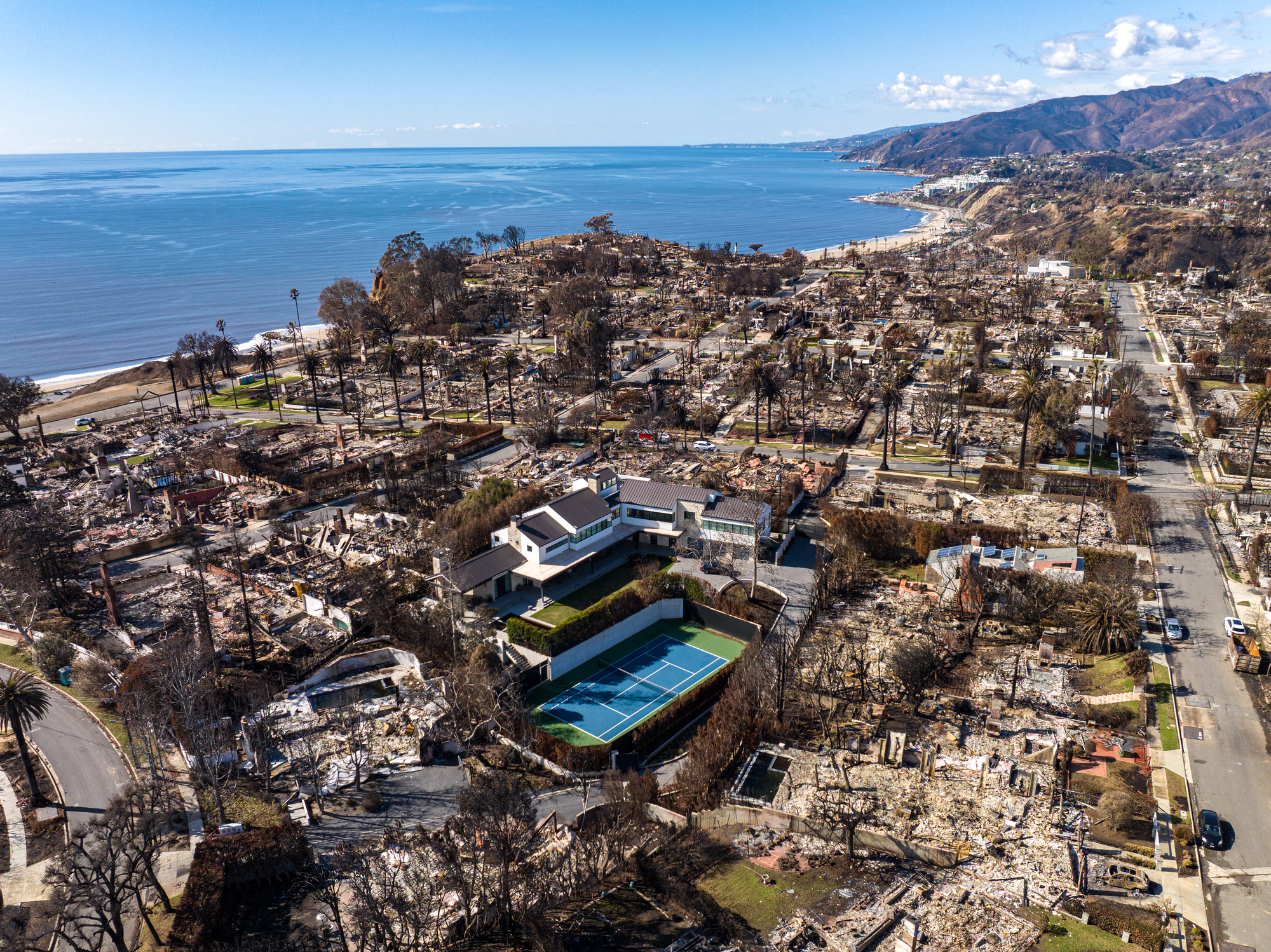State Farm Seeks Emergency Insurance Rate Hikes in California After Wildfires
State Farm is seeking emergency rate hikes of up to 38% for California homeowners, renters and landlords following wildfire losses.


Profit and prosper with the best of Kiplinger's advice on investing, taxes, retirement, personal finance and much more. Delivered daily. Enter your email in the box and click Sign Me Up.
You are now subscribed
Your newsletter sign-up was successful
Want to add more newsletters?

Delivered daily
Kiplinger Today
Profit and prosper with the best of Kiplinger's advice on investing, taxes, retirement, personal finance and much more delivered daily. Smart money moves start here.

Sent five days a week
Kiplinger A Step Ahead
Get practical help to make better financial decisions in your everyday life, from spending to savings on top deals.

Delivered daily
Kiplinger Closing Bell
Get today's biggest financial and investing headlines delivered to your inbox every day the U.S. stock market is open.

Sent twice a week
Kiplinger Adviser Intel
Financial pros across the country share best practices and fresh tactics to preserve and grow your wealth.

Delivered weekly
Kiplinger Tax Tips
Trim your federal and state tax bills with practical tax-planning and tax-cutting strategies.

Sent twice a week
Kiplinger Retirement Tips
Your twice-a-week guide to planning and enjoying a financially secure and richly rewarding retirement

Sent bimonthly.
Kiplinger Adviser Angle
Insights for advisers, wealth managers and other financial professionals.

Sent twice a week
Kiplinger Investing Weekly
Your twice-a-week roundup of promising stocks, funds, companies and industries you should consider, ones you should avoid, and why.

Sent weekly for six weeks
Kiplinger Invest for Retirement
Your step-by-step six-part series on how to invest for retirement, from devising a successful strategy to exactly which investments to choose.
State Farm General, the largest provider of Fire insurance in California, has requested an emergency rate hike of 22% for homeowners following one of the most expensive natural disasters in U.S. history. The company has already paid out over $1 billion in claims, with more expected in the coming months.
In a letter to the California Department of Insurance (CDI), State Farm argues that these increases are necessary to maintain financial stability and continue offering coverage in wildfire prone areas. “This request will help avert a dire situation for our customers,” the company stated.
California has an insurance crisis, as residents already pay some of the highest home insurance premiums in the country, and major insurers have pulled back from the market in recent years due to rising wildfire risks. With this latest request, homeowners could face even higher costs and fewer coverage options.
From just $107.88 $24.99 for Kiplinger Personal Finance
Become a smarter, better informed investor. Subscribe from just $107.88 $24.99, plus get up to 4 Special Issues

Sign up for Kiplinger’s Free Newsletters
Profit and prosper with the best of expert advice on investing, taxes, retirement, personal finance and more - straight to your e-mail.
Profit and prosper with the best of expert advice - straight to your e-mail.
The growing financial toll of wildfires in California
The recent wildfires in California have caused an estimated $135 billion to $150 billion in total damage and economic losses, according to AccuWeather. The Los Angeles region alone saw 12,000 homes destroyed, adding to the growing financial strain on insurers.
As of February 1, State Farm General has received more than 8,700 claims, already paying out over $1 billion, with additional claims expected. In a statement, the company emphasized that rate increases are necessary to cover future claims, given the growing risks in the state.
However, the California Department of Insurance has raised concerns about State Farm’s financial situation, questioning the justification for these rate hikes. "To protect millions of California consumers and the integrity of our residential property insurance market, the Department will respond with urgency and transparency to recommend a course of action for Commissioner Ricardo Lara," CDI stated.
Currently, there is no proposed timeline for approval or denial of State Farm’s request.
State Farm seeks sharp rate increases across California
State Farm is proposing substantial rate hikes across different property types, including:
- 22% increase for homeowners
- 15% increase for renters and condo owners
- Up to 38% increase for rental dwellings
The company cites rising wildfire risks and mounting financial losses as justification, claiming these increases are crucial to offset claims and ensure long-term stability.
However, consumer advocacy groups like Consumer Watchdog, have strongly opposed the request. Critics argue that homeowners should not bear the burden of corporate losses, especially when State Farm’s parent company holds $135 billion in reserves. They also point to State Farm’s $1.4 billion in profits from 2020 to 2022, questioning the timing and necessity of such a drastic hike.
State Farm has pursued similar increases before. A previous 20% rate hike took effect in March 2024. In June 2023, the company applied for a 30% rate increase totaling $1.3 billion, arguing that California policyholders — not its parent company — should help shore up its finances.
Other insurers, including Allstate and Farmers, have also sought double-digit rate increases or reduced their presence in California, citing similar financial pressures.
How homeowners can navigate rising insurance costs
With rising insurance costs and fewer options, California homeowners must explore alternatives to protect their properties. Some may turn to the California FAIR Plan, a last-resort insurance program for high-risk areas, though it often comes with higher premiums and limited coverage. Others might try bundled policies or regional insurers that still operate in wildfire-prone areas.
Another way to manage rising costs is through mitigation efforts to protect your home from natural disaster, which may make homeowners eligible for discounts or expanded coverage. For wildfires, this includes fire-resistant roofing, defensible space around properties and improved sprinkler systems. Some insurers, including State Farm, offer incentives for wildfire-resistant improvements but availability and savings vary.
Use our tool below, in partnership with Bankrate, to compare today’s home insurance rates:
State Farm’s proposed rate hikes underscore the worsening crisis in California’s home insurance market. Insurers face mounting wildfire-related losses, and homeowners struggle with rising costs. The outcome of State Farm’s emergency request will set a precedent for future rate increases and could influence how other insurers approach coverage in high-risk regions.
Beyond California, this issue has broader implications for other disaster-prone states, where hurricanes, floods and wildfires are driving higher insurance costs and insurer withdrawals. As regulators weigh consumer protection against insurer solvency, the uncertainty surrounding State Farm’s request leaves many homeowners wondering just how much higher premiums can go before coverage becomes unattainable.
Related content
Profit and prosper with the best of Kiplinger's advice on investing, taxes, retirement, personal finance and much more. Delivered daily. Enter your email in the box and click Sign Me Up.

Carla Ayers joined Kiplinger in 2024 as the eCommerce and Personal Finance Editor. Her professional background spans both commercial and residential real estate, enriching her writing with firsthand industry insights.
Carla has worked as a personal finance and real estate writer for Rocket Mortgage, Inman and other industry publications.
She is passionate about making complex real estate and financial topics accessible to all readers. Dedicated to transparency and clarity, her ultimate goal is to help her audience make informed and confident decisions in their financial pursuits.
-
 Quiz: Do You Know How to Avoid the "Medigap Trap?"
Quiz: Do You Know How to Avoid the "Medigap Trap?"Quiz Test your basic knowledge of the "Medigap Trap" in our quick quiz.
-
 5 Top Tax-Efficient Mutual Funds for Smarter Investing
5 Top Tax-Efficient Mutual Funds for Smarter InvestingMutual funds are many things, but "tax-friendly" usually isn't one of them. These are the exceptions.
-
 AI Sparks Existential Crisis for Software Stocks
AI Sparks Existential Crisis for Software StocksThe Kiplinger Letter Fears that SaaS subscription software could be rendered obsolete by artificial intelligence make investors jittery.
-
 One of the Most Powerful Wealth-Building Moves a Woman Can Make: A Midcareer Pivot
One of the Most Powerful Wealth-Building Moves a Woman Can Make: A Midcareer PivotIf it feels like you can't sustain what you're doing for the next 20 years, it's time for an honest look at what's draining you and what energizes you.
-
 I'm a Wealth Adviser Obsessed With Mahjong: Here Are 8 Ways It Can Teach Us How to Manage Our Money
I'm a Wealth Adviser Obsessed With Mahjong: Here Are 8 Ways It Can Teach Us How to Manage Our MoneyThis increasingly popular Chinese game can teach us not only how to help manage our money but also how important it is to connect with other people.
-
 Looking for a Financial Book That Won't Put Your Young Adult to Sleep? This One Makes 'Cents'
Looking for a Financial Book That Won't Put Your Young Adult to Sleep? This One Makes 'Cents'"Wealth Your Way" by Cosmo DeStefano offers a highly accessible guide for young adults and their parents on building wealth through simple, consistent habits.
-
 My Spouse and I Are Saving Money for a Down Payment on a House. Which Savings Account is the Best Way to Reach Our Goal?
My Spouse and I Are Saving Money for a Down Payment on a House. Which Savings Account is the Best Way to Reach Our Goal?Learn how timing matters when it comes to choosing the right account.
-
 We're 78 and Want to Use Our 2026 RMD to Treat Our Kids and Grandkids to a Vacation. How Should We Approach This?
We're 78 and Want to Use Our 2026 RMD to Treat Our Kids and Grandkids to a Vacation. How Should We Approach This?An extended family vacation can be a fun and bonding experience if planned well. Here are tips from travel experts.
-
 My First $1 Million: Retired From Real Estate, 75, San Francisco
My First $1 Million: Retired From Real Estate, 75, San FranciscoEver wonder how someone who's made a million dollars or more did it? Kiplinger's My First $1 Million series uncovers the answers.
-
 To Love, Honor and Make Financial Decisions as Equal Partners
To Love, Honor and Make Financial Decisions as Equal PartnersEnsuring both partners are engaged in financial decisions isn't just about fairness — it's a risk-management strategy that protects against costly crises.
-
 Top 5 Career Lessons From the 2026 Winter Olympics (So Far)
Top 5 Career Lessons From the 2026 Winter Olympics (So Far)Five lessons to learn from the 2026 Winter Olympics for your career and finances.